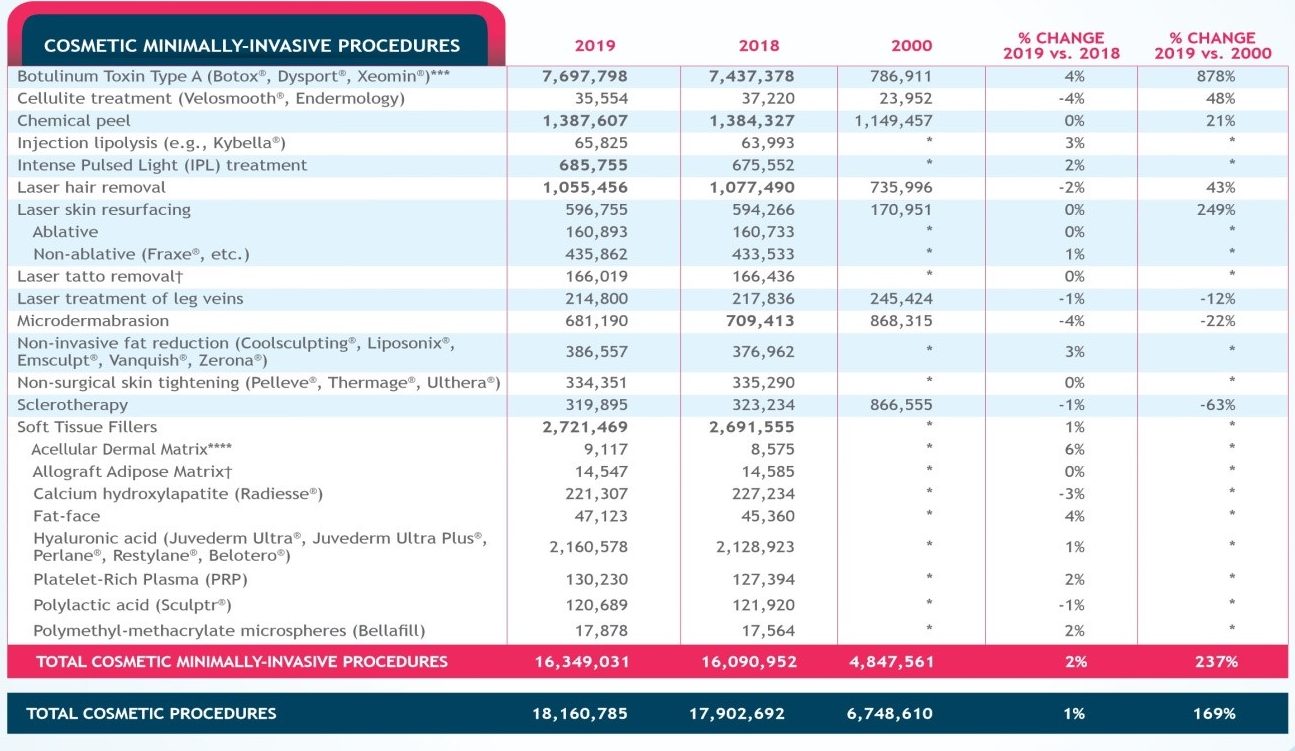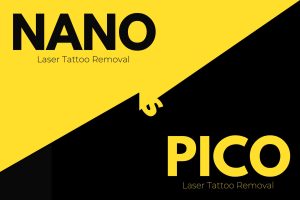People tend to care a lot about their physical appearances. That is probably why medical aesthetics is projected to become a $17.7 billion market by 2023. A major driver of this growth has been the growing demand for minimal and non-invasive cosmetic procedures. Some of the most popular ones are laser hair removal, tattoo removal, and skin rejuvenation. According to the American Society for Aesthetic Plastic Surgery (ASAPS), there was a 7.3% rise in the number of non-surgical aesthetic procedures performed in 2016. These numbers continue to grow. While some states allow only a medical professional to operate a laser, most states allow anyone with the necessary certifications to do the same. Becoming a laser technician is within reach!

Source: plasticsurgery.org
Workplace:
A laser technician can work at a medical spa, salon, or a laser center, under the supervision of a medical professional. They can also work at a clinic, assisting a doctor. This generally includes dermatology, plastic surgery, and ophthalmology practices.
While most states allow anyone with appropriate laser training to operate a laser, certain procedures and treatments may be restricted under appropriate cosmetology or medical laws.
Services:
Laser treatment covers a wide range of services, and it’s a laser technician’s job to deliver them well.
Some of them are:
- Hair Removal
- Skin Rejuvenation
- Skin Tightening
- Wrinkle Reduction
- Acne and Acne Scars Treatment
- Laser Peels
- Photofacials
- Lesion Removal
- Tattoo Removal
There is a lot of untapped potential in the field of laser. New benefits and uses are constantly being discovered. A laser technician has the opportunity to move along with these changes. It’s still very much a new and growing career.
Laser Technician Salary and Job Opportunities:
According to the U.S. Bureau of Labor Statistics, skincare specialists, including laser technicians, will witness an 11% growth in job opportunities during the period 2018-2028. The median annual salary in this sector is $34,091, whereas the top 10% earned as high as $62,546 (2019). Salary also varies depending on location, employer, and types of treatment delivered. Some laser technicians also get 3-50% commissions. It is common in this field to work more than 40 hours a week, sometimes even on weekends and evenings.
Becoming a Laser Technician:
Operating a laser requires skill and expertise. To become a true professional and to gain the trust of the customers, it is very important to graduate from a recognized laser institute.
Laser Technician School:
Laser training programs can last anywhere from a few weeks to months. Some programs may be open only to people with medical backgrounds (depending on state laws). Obtaining a proper degree in laser technology can take up to a few years. These programs focus on two aspects – laser knowledge and hands-on training. Some of the most crucial areas of study are laser safety, laser devices, laser biophysics, effects on skin tissues, regulatory guidelines, and pre and post-patient care. After classroom teaching, the program focuses on clinical training. The professors show students how to use the laser and perform different treatments (tattoo removal, hair removal, etc). Students then perform these procedures under supervision. Choosing the right school for training is very important. The school must be accredited or certified under appropriate regulations to be legitimate.
Each state also has different eligibility criteria (licenses and registration) for working. For example, Arizona requires a state license authorized by the Arizona Radiation Regulatory Agency (ARRA) for laser training.
 Source: intlbeautyinstitute.com
Source: intlbeautyinstitute.com
Certified Laser Technician:
It is important to know that completing training and obtaining certification is not the same. Generally, certification requires passing a final examination following the completion of the training program and clinical experience. National Council on Laser Certification (NCLC), International Aesthetic and Laser Association (IALA) (now merged with AmSpa), the Board of Laser Safety (BLS), as well as some state medical boards authorize laser certifications. Some of the common certifications are – Certified Laser Specialist (CLS) Certification, Laser Safety Officer (LSO) Certification, Certified Laser Hair Removal Specialist, etc. While getting certified is not a compulsory requirement in most states, certification can enhance credibility and prospects.
How much does it cost to become a laser technician?
Cost of the program will depend upon the choice of school and the length and type of training program:
- 2-3 days seminar and workshops can cost as low as $1,000.
- Programs that cover 40-60 hours of training might cost anything between $2500 to $5000.
- 90-120 hours courses may cost as much as $6,000 or more.
- Examination fees for certification may be around $200-$300.
- Renewal of certification generally costs around $90-$100 (NCLC).
Many training programs/schools also offer financial aid and grants.
Skills and qualities of a good laser technician:
- Communication skills – A significant part of this job entails interactions with customers. A laser technician needs to have an approachable personality and good communication skills. A laser technician should keep their clients well-informed and comfortable throughout the process.
- Laser Knowledge – Lasers are high technology devices that need great care and attention. A laser technician must be well aware of its different features, uses, and functioning.
- Judgment – A laser technician must be able to determine when a customer’s condition requires professional medical care.
- Swift and Attentive –It is a must to have good eye-hand coordination and swift and steady movements. They should be careful of the smallest details.

Time to use these newfound powers.




